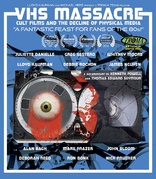VHS Massacre Blu-ray Movie
HomeVHS Massacre Blu-ray Movie 
Troma | 2017 | 72 min | Not rated | May 09, 2017Movie rating
6.6 | / 10 |
Blu-ray rating
| Users | 0.0 | |
| Reviewer | 3.0 | |
| Overall | 3.0 |
Overview
VHS Massacre (2017)
This lively documentary explores the rise and fall of physical media and its effect on Independent and cult films.
Starring: Mike Aransky, Alan Bagh, John Bloom (I), Ron Bonk, Carmine CapobiancoDirector: Kenneth Powell, Thomas Edward Seymour
| Documentary | 100% |
Specifications
Video
Video codec: MPEG-4 AVC
Video resolution: 1080p
Aspect ratio: 1.78:1
Original aspect ratio: 1.78:1
Audio
English: LPCM 2.0 (48kHz, 16-bit)
BDInfo
Subtitles
None
Discs
Blu-ray Disc
Single disc (1 BD)
Playback
Region A (B, C untested)
Review
Rating summary
| Movie | 2.0 | |
| Video | 3.5 | |
| Audio | 2.5 | |
| Extras | 2.5 | |
| Overall | 3.0 |
VHS Massacre Blu-ray Movie Review
Reviewed by Brian Orndorf May 26, 2017There’s been much debate on the possibly of physical media coming to an end, replaced by the rise in downloading and streaming offerings that utilize faster internet speeds, playing directly to an audience that doesn’t feel the need to own movies or visit a theater. It’s a sad state of affairs, and demands a documentary that carefully examines both sides of the argument, inspecting the history of physical media and its evolution over the years to its current position of perceived extinction. Sadly, “VHS Massacre” is not the production prepared to dissect the essentials in education and example to make a strong argument for either side. Instead of an insightful endeavor that makes an effort to encompass a wide range of topics, the documentary is more of a grab bag of ideas, pinballing around discussions and interviewees with little to no focus, failing to achieve a greater presentation of theme and nostalgia.
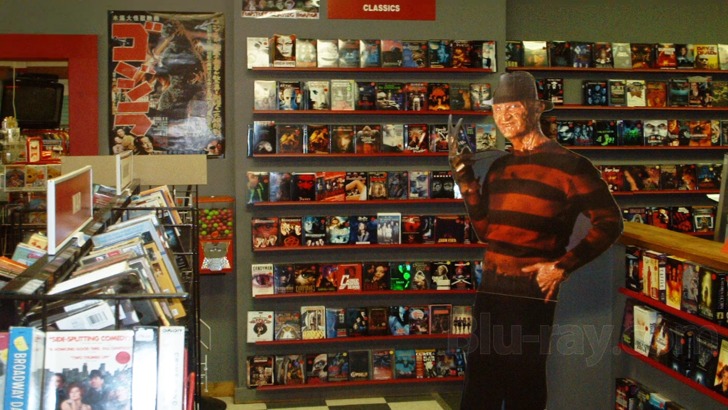
The basic idea of “VHS Massacre” is coverage of a 2012 game where podcasters Kenneth Powell, Thomas Edward Seymour, and David Leute set out to find the weirdest titles on the VHS market, bringing their selections to a party where the player who acquired the worst of the bunch would be crowned king of the evening. The documentary has the initial makings of an entertaining scavenger hunt movie, following Seymour and Powell (Leute is inexplicably absent for most of the picture) as they visit what remains of the home video market, starting with the closing of a local Blockbuster Video before digging deeper into obscure video stores, trying to find VHS offerings that managed to remain on shelves for decades, waiting for podcast mockery. If “VHS Massacre” remained in this pocket of nostalgia, taking special care of the acquisitional adventure, perhaps something insightful could be found about the state of the industry from a retail perspective. Unfortunately, the production wants to wrap its arms around the whole history of home video exhibition, and it just doesn’t have the vision for such an extensive journey.
“VHS Massacre” has the right idea, attempting to gather a variety of personalities and experts to detail the history of physical media, with specific attention paid to tape-based offerings. People like Joe Bob Briggs, Carmine Capobianco, and Debbie Rochon are brought in to discuss their personal opinions on the VHS glory years, describing the omnipresence of low-budget titles meant to stuff the shelves of video stores begging for product. Quality wasn’t essential, and the documentary showcases a few titles that made it to the rental market during this era, while Briggs specifically shares his expertise on genres and creative interests. It’s entertaining to go down memory lane with the interviewees, and “VHS Massacre” adds to the experience by taking cameras into stores, surveying the few mom and pop places that still stand (at least in 2012), picking up titles that could compete during the undated celebration of all things awful.
Seymour and Powell are the credited directors, and they don’t have much of a game plan for “VHS Massacre.” Stratagem with the tape hunt is abandoned almost immediately after it’s introduced, creating an ADD atmosphere to the endeavor as the documentary jumps from topic to topic, provided little introduction and even less resolution. One minute the feature is visiting what remains of a beloved childhood VHS rental chain, the next explores the lure of cover art. Bits on tape collecting are included, along with homegrown efforts to keep the market alive, interviewing the few still producing VHS today, catering to a niche market that honestly loves the low-fi look of the movies, which is a question of taste that could inspire its own documentary. There are a few minutes devoted to the rise of VHS and its initial battle with Betamax, and even less on the DVD uprising and our current Blu-ray world (4K introductions are not included). Streaming should be a major part of “VHS Massacre,” but it’s also handed a pitiful amount of screentime to explore (along with piracy), basically boiling down to complaints about tiny artwork and bad financial deals, with Troma’s Lloyd Kaufman refreshingly candid about his dealings with Netflix.
There’s just not enough to “VHS Massacre” to satisfy, and not helping the cause is the amateurish assembly of the picture, which highlights abrupt silences, awkward editing, and a strange disregard for resolution, chatting up the wonders of 8mm, 16mm, 35mm, and HD, but always returning to blocky YouTube clips for examples, confusing arguments. And there’s a whole movie to be made about Seymour, whose own directorial effort, 2012’s “Rudyard Kipling’s Mark of the Beast,” plays a prominent part in the documentary, including a trip to find a DVD copy in local stores. Seymour is visibly hurt by the feature’s bad reviews, but he thinks nothing of mocking the sincerity of the game’s VHS selections (most are trying to be educational), introducing an intriguing hypocrisy the documentary isn’t prepared to dissect.
VHS Massacre Blu-ray Movie, Video Quality 
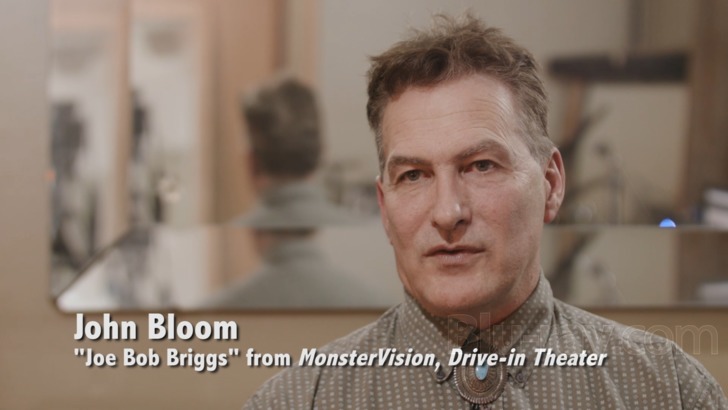
The AVC encoded image (1.78:1 aspect ratio) presentation for "VHS Massacre" remains in line with other documentaries shot on commercial grade HD equipment. Sharpness is impressive at times, generating a satisfying level of detail on interviewees and video store visits, allowing viewers to pause the movie and check out poster art and shelf treasures. Colors are bold and bright, handling primaries with power, eased along by artwork and clothing. Skintones are natural. Delineation isn't challenged in full, but blacks remain adequate. Mild banding is rare but present.
VHS Massacre Blu-ray Movie, Audio Quality 
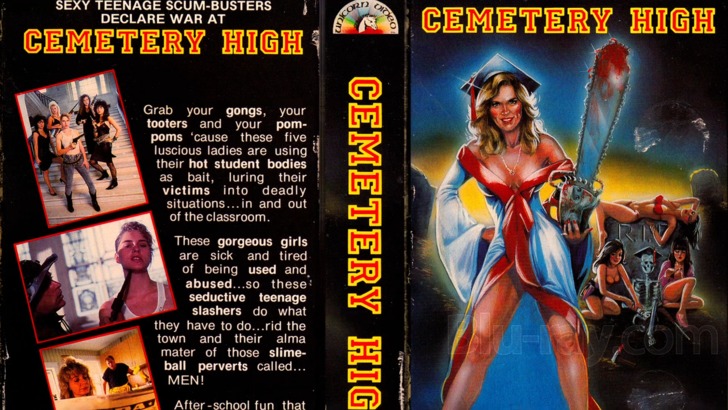
Little care went into the sound recording of "VHS Massacre," leaving the 2.0 LPCM track inherently weak. Elements such as scoring come through with some degree of power, with synth offerings adding heft and support. Interview segments are problematic, fighting unpleasant compression issues and echoed locations, making stories difficult to understand at times. The track is doing what it can with the original mix, but more work was needed to bring audio standards up to a professional level.
VHS Massacre Blu-ray Movie, Special Features and Extras 
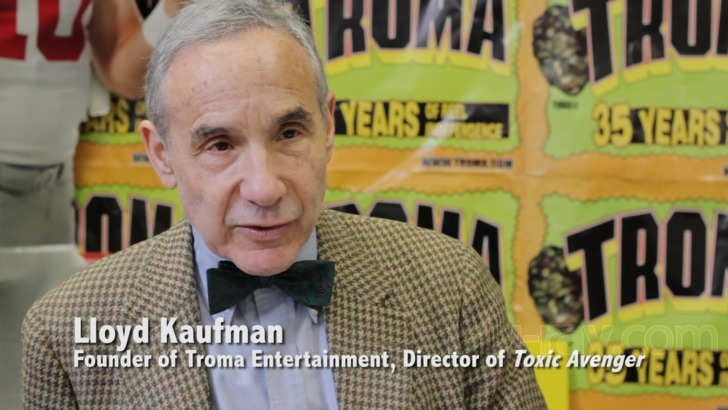
- Intro (5:07, HD) opens with Lloyd Kaufman's suicide, inspiring the makers of "VHS Massacre" to travel back to 1989 and break up a "Toxic Avenger: Part III" VHS release party to save the Troma Films honcho.
- Commentary features Kenneth Powell, Thomas Edward Seymour, and David Leute.
- "Monster Kill" (1:09, HD) is a trailer for Seymour's B-movie lampoon web series.
- "Monster Kill: Merminators from Space" (17:12, HD) is an episode of the show, joining hosts Louanne Louanne and Double Dementia as they introduce one of the program's no-budget B-movie offerings.
- "Troma's Answer to #oscarssowhite" (9:26, HD) is more of a rant from Lloyd Kaufman, who rails again corporate entertainment entities and explores the history of legal movements over the last 200 years to keep art open and available to all, encouraging diversity, not forcing it. The performance concludes with a plea to preserve net neutrality.
- "Troma Now Xtreme Edition" (1:43, SD) is a commercial for the company's website, sold with dark humor and graphic nudity.
- "Radiation March" (:56, SD) is a short dance piece concerning the dangers of pollution.
- And a Trailer (1:35, HD) is included.
VHS Massacre Blu-ray Movie, Overall Score and Recommendation 
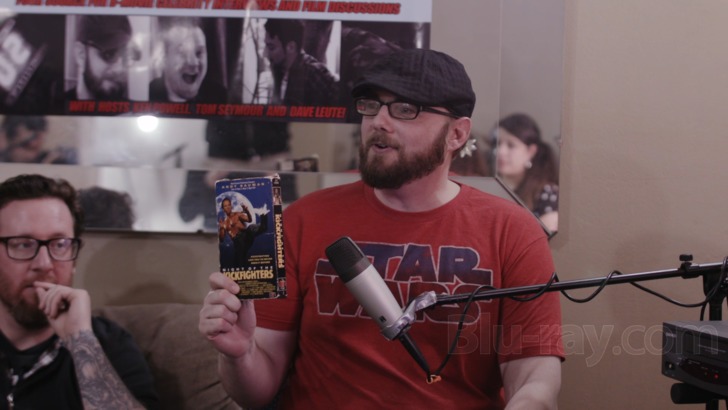
"VHS Massacre" means well enough, and tape freaks might get a little more out of it than the average fan of cult features and oddities. However, it's such a disorganized documentary with limited reach and understanding of its own topic, which eventually reaches out to the need for net neutrality. At 71 minutes in length, nothing's allow to marinate, and a sizable chunk of the run time is devoted to the outcome of the game, watching the podcasters sample their selections, adding one last abrupt turn to an unsatisfying overview of an important issue for film fans, especially those who enjoying owning and controlling their media.
Similar titles
Similar titles you might also like

Hammer Horror: The Warner Bros. Years
Limited Edition of 1000
2017

Cassettes Go Hi-Fi
2019

The First VCR
2019

In Search of Tomorrow
2022

Everything to Entertain You: The Story of Video Headquarters
Slipcover in Original Pressing
2023

78/52: Hitchcock's Shower Scene
2017

Room 237
2012

Vinyl Nation
Slipcover in Original Pressing
2020

RoboDoc: The Creation of RoboCop
2023

Adjust Your Tracking: The Untold Story of the VHS Collector
Slipcover in Original Pressing
2013

Story of a Junkie
Gringo
1985

Blood, Guts and Sunshine
Slipcover in Original Pressing
2021

Scream, Queen! My Nightmare on Elm Street
2019

Horror Noire: A History of Black Horror
2019

Satanis: The Devil's Mass
1970

The Scare Film Archives Volume 1: Drug Stories!
2018

Cursed Films: Season Two
2021-2022

The Scare Film Archives Volume 2: Danger Stories
2025

The Rock-afire Explosion
Slipcover in Original Presisng
2008

The AGFA Horror Trailer Show
2020
